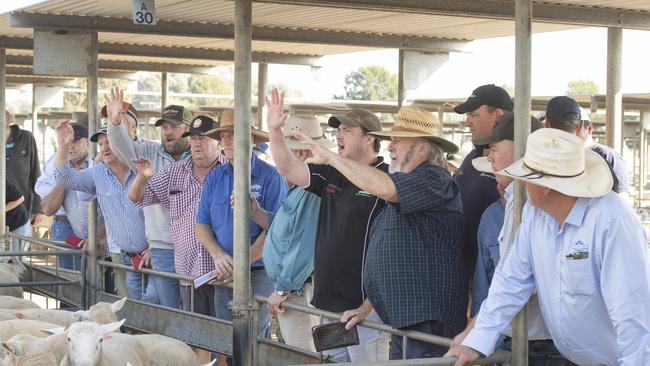Light lamb prices at Bendigo prime sale impacted by Middle East conflict
Lamb exports are being sent back to Australia to be reprocessed for other markets as Iran’s attack on Israel shuts down flights into the Middle East. See its impact on prices.
Lamb exports are being sent back to Australia to be re-processed for other markets as Iran’s attack on Israel shuts down flights into the Middle East.
Iran over the weekend launched a barrage of missiles and armed drones towards Israel in a confrontation that threatens to bring the Middle East to the brink of a regional war
The Middle East is a significant market for Australian lamb, particularly light carcasses which are air freighted whole in what is known as the “bag trade”.
The crisis took the edge off prices at early markets this week with the National Livestock Reporting Service quoting light lambs as $20-$40 a head cheaper at Bendigo on Monday.
It comes amid warnings that an escalation of the conflict could hit shipping costs for Australian exports bound for Europe if shipments are forced to circumvent the Red Sea via Africa’s Cape of Good Hope, adding more than a week to the journey time.
Midfield Meats at Warrnambool, a volume buyer of light, Muslim Kill lambs, confirmed that air freighted exports from Australia were “on the way back” on Monday, after commercial flights were disrupted over the weekend.
“It’s not just Iran but the Middle East in general,” Dean McKenna, son of the company’s founder Colin McKenna, told The Weekly Times on Monday.
“I don’t think anyone knows when it will reopen again.”
Mr McKenna said the Middle East had been an important market for lamb from Midfield for 30 years.
“I’ve got meat coming (flying) back to us today,” he said.
Those bagged lamb carcasses could not be redirected, Mr McKenna said, but would need to be “reprocessed into other forms” at the Warrnambool meat processing plant.
“It is a hiccup in the job, but that region is one market, we have 89 countries that we can supply,” he said.

While the disruption was a “problem for the industry” Mr McKenna said it was “part of what we do, and I’m not worried, yes we are mindful of it but that is all part of what we do”.
Export lamb sales to the Middle East and North Africa surged last year, after the market went extremely quiet four years ago.
The Weekly Times reported last November that the Muslim Kill or “bag lamb” trade, for carcasses weighing 14-18kg, had come alive at a crucial time for the industry as more light-conditioned lambs were being sold into a market which had limited restocking power in spring.
It was seen as a positive for farmers selling suckers into the spring market impacted by concerns about a potentially dry season.
The amount of lamb airfreighted from Victoria to the Middle East in October last year was six times greater than October 2022, according to data released by the Australian Department of Agriculture, Fisheries and Forestry.
These lambs are exported in whole-carcass form packaged in individual bags. Most lambs sold under the Muslim Kill label end up in the Middle East. Victoria is a key state for bag lamb production.
FEARS FOR EU EXPORT COSTS
Rabobank analyst Vítor Caçula Pistóia has warned that freight and input costs for Australian exports headed for Europe could rise if Israel retaliates to Iran’s drone attacks on the weekend.
“We have to wait and see if Israel and its allies react. If they do flex their muscles we could see an escalation in (the price of) crude oil. And if that happens, we could potentially see headwinds for farm input costs, including fertiliser, energy and diesel,” Mr Pistóia said.
“Australian exports will be predominantly going around Africa, increasing the voyage time by seven or eight days, so extra costs.”
Australia is one of the biggest exporters of canola seeds into the EU.
The Red Sea is the usual passage for sea freight moving between Europe and Australia, but the narrow canal has been subjected to sustained assault from a militia group in Yemen. The group, Ansar Allah, has trying to sabotage global trade in an effort to support Hamas following Israel’s war on Gaza.
The drone and rocket attacks began in October last year and have already led to a drop off in traffic through the narrow straight straddling Africa and the Middle East.
Last month, about 40 container ships sailed through the Red Sea each day, according to The Kiel Institute for The World Economy, compared to more than 100 last year, before the attacks began.




